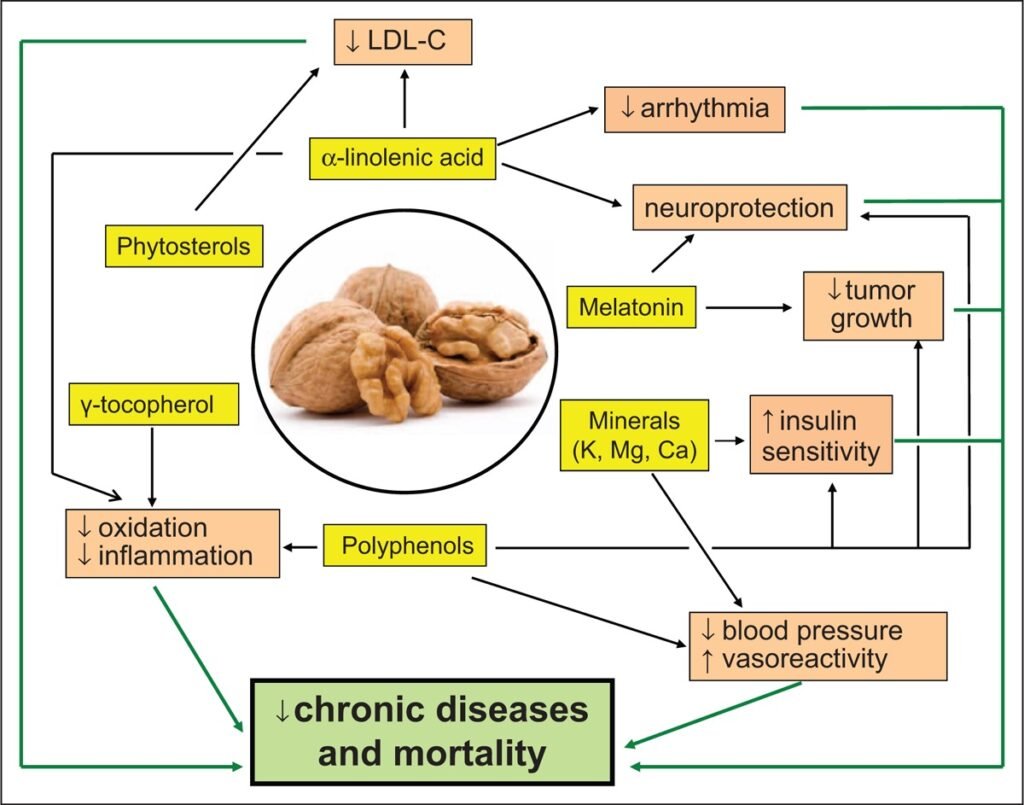Walnuts, scientifically known as Juglans regia, constitute one of the most significant nutritive nut crops within the angiospermic family Juglandaceae. Thriving optimally in Mediterranean climates, they require approximately 600 to 800 hours of temperatures ranging between 0°C and 10°C during winter (referred to as Winter Chill), alongside a frost-free period during flowering and summer temperatures below 38°C. It actually seems like Brain.

Bio-chemical Presents in Walnuts
The kernel stands as a rich reservoir of proteins, fats, vitamins, minerals, and polyphenols, rendering it an indispensable component of human nutrition. Additionally, it serve as a notable source of flavonoids, sterols, phenolic acids, and associated polyphenols. Researchers have posited that the presence of omega-3 fatty acids, antioxidants, and phytosterols in it underpins their numerous health benefits.
It boast high levels of omega-6 and omega-3 polyunsaturated fatty acids, both of which are essential dietary components. The primary benefits attributed to its kernels encompass cholesterol reduction, enhancement of the ratio of high-density lipoprotein cholesterol to total cholesterol, inflammation reduction, and improvement in arterial function.
Nutrient available in Walnut
It contain approximately 65% fat by weight, with a notable proportion comprising the healthy omega-3 fatty acid known as alpha-linolenic acid (ALA). The protein content is reported to range from 13.6 to 18.1 grams of crude protein per 100 grams of dry matter. Additionally, it serve as an excellent source of Vitamin E (γ-tocopherol), supplying 21 milligrams per 100 grams.
Notably, it stand out as one of the main food sources of phytomelatonin, boasting an average content of 350 nanograms per 100 grams. They are also recognized as one of the most significant sources of total polyphenols, with reported levels reaching up to 2500 milligrams per 100 grams.
Furthermore, it esteemed as the richest plant source of ellagitannins, with a concentration of approximately 1600 milligrams per 100 grams. In addition to these nutritional attributes, it provide protein (4 grams per ounce), fiber (2 grams per ounce), phosphorus (constituting 10% of the daily value), and magnesium (constituting 11% of the daily value). Moreover, walnuts boast the highest phenolic content among nuts, with a substantial antioxidant profile, including flavonoids, phenolic acids (such as ellagic acid), melatonin, folate, gamma tocopherol (a form of Vitamin E), selenium, juglone, and proanthocyanidins (anti-inflammatory properties), contributing to a total antioxidant content of 3.68 millimoles per ounce.
Health Benefits
Reduce Risk of Cancer
Consuming kernel has been associated with a reduction in cancer mortality, with evidence indicating that incorporating it into one’s diet can significantly decrease the number and size of breast cancer tumors.
Among the numerous bioactive compounds found in it, ellagic acid and urolithins have been extensively studied for their ability to inhibit cancer cell proliferation. Additionally, phenolic compounds extracted from extracts have shown a dose-dependent inhibition of the growth of colon, breast, and prostate cancer cells.
These potential benefits are thought to arise from mechanisms such as decreased amyloid-beta fibrillization, reduced oxidative damage, enhanced antioxidant defense, and diminished neuroinflammation.
Walnut Decrease Cardiovascular Risk
Studies have demonstrated that incorporating it into the diet can significantly reduce total and LDL cholesterol levels. In a study conducted in Iran, 52 volunteers were divided into two groups: one consumed 20 grams daily, while the other group did not. After eight weeks, the consuming group experienced a notable decrease in triglyceride levels by 17.1% and an increase in HDL (good) cholesterol levels by 9%.
It contribute to the reduction of LDL cholesterol levels, with phytosterols, unsaturated fatty acids, and fiber found in it playing a role in justifying these cholesterol-lowering properties.
Moreover, alpha-linolenic acid (ALA) present in it is particularly beneficial for heart health, aiding in reducing inflammation and improving the composition of blood fats.
Furthermore, despite their low sodium content, Kernel are rich in potassium, magnesium, and calcium. These minerals play crucial roles in various cellular and physiological processes, including insulin sensitivity, blood pressure regulation, and vascular reactivity.
Consequently, consuming walnuts may help lower the risk of major cardiovascular risk factors such as metabolic syndrome, diabetes, and hypertension, while also improving endothelial function. Therefore, it may offer potential benefits for individuals with cardiovascular disease and type 2 diabetes.
Control Stroke

It contribute to a potassium and sodium balance, making them a valuable addition to a diet aimed at preventing strokes and reducing cardiovascular disease (CVD) mortality. Increasing potassium intake is generally recommended as a strategy for stroke prevention and reducing the risk of CVD-related deaths.
Furthermore, research indicates that a combined diet score, considering potassium, magnesium, and calcium levels, correlates with a reduced risk of stroke.
Reduce Body weight

In a study conducted at Harvard Medical School, 20 men and women diagnosed with metabolic syndrome participated in a randomized, double-blind, crossover study examining the effects of walnut consumption. Remarkably, after just three days, participants who consumed its shake reported feeling significantly more satisfied and less hungry compared to those who did not.
Improve parameters in polycystic ovary syndrome (PCOS)
In a study conducted at UC Davis, 31 patients diagnosed with polycystic ovary syndrome (PCOS) were randomly assigned to receive either walnuts or almonds, both containing 31 grams of total fat per day, for a duration of 6 weeks. PCOS, commonly associated with insulin resistance, dyslipidemia, and increased inflammation. Consumption of walnuts led to a notable 6% reduction in LDL cholesterol levels. Additionally, kernel were found to enhance insulin response and increase levels of sex hormone-binding globulin.
Control Diabetes
Australian researchers conducted a study involving 50 overweight adults with diabetes, who participated in a one-year program where they consumed 30 grams daily. During the initial three months of the study, the group consuming it experienced a significant reduction in their fasting insulin levels. These findings suggest that walnuts may offer potential benefits in managing both cardiovascular disease and type 2 diabetes.
Cognitive Function
In a study involving 64 college students, researchers assigned participants to either consume walnuts or a placebo. After eight weeks, it was observed that individuals who consumed walnuts experienced an 11.2% increase in their inferential verbal reasoning abilities. Additionally, other research suggests that a higher intake of antioxidant-rich foods may contribute to an extended “health span” and improved cognitive and motor function as individuals age. Furthermore, there is evidence to suggest that kernel may lower the risk or slow the progression of various brain disorders such as Parkinson’s disease, stroke, and depression.
The metabolism of alpha-linolenic acid (ALA), a prominent component of its, involves a modest conversion to its longer chain counterparts, primarily eicosapentaenoic acid (EPA) and docosahexaenoic acid (DHA). Intake of DHA or foods containing its precursor, ALA, has been associated with protection against neurological diseases. Further more, It may play a role in maintaining cognitive function reducing the risk and dementia.
Sleep

It exhibit a range of beneficial properties including antioxidant, anti-inflammatory, anti-obesity, anticancer, and neuroprotective activities. They are particularly renowned for their role in regulating sleep.
Furthermore, ellagitannins present in walnuts release ellagic acid, which is subsequently metabolized by intestinal bacteria into urolithins. Urolithins are more readily absorbed than ellagitannins, reaching the bloodstream and targeting various organs and tissues. Both ellagitannins and urolithins possess numerous biological activities, including antioxidant, anti-inflammatory, anticancer, and prebiotic effects, suggesting a wide range of potential health benefits for human beings.
In human studies, it has been reported that the acute consumption of walnuts increases the total antioxidant capacity and reduces plasma lipid peroxidation. Various components of walnuts, including flavonoids, ellagic acid, gamma tocopherol, and melatonin, are recognized for their antioxidant properties and their ability to scavenge free radicals.

